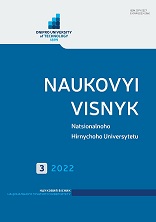

 | Наукова періодика України | 
| Naukovyi visnyk Natsionalnoho Hirnychoho Universytetu |
Kovalenko I. I. Clustering of group expert estimates based on measures in the theory of evidence / I. I. Kovalenko, A. V. Shved // Науковий вісник Національного гірничого університету. - 2016. - № 4. - С. 71-77. - Режим доступу: http://nbuv.gov.ua/UJRN/Nvngu_2016_4_11 Purpose. The main purpose of the article is a study of new approaches and development of mathematical models of group expert estimate structuring (clustering) based on mathematical apparatus of modern theories. Methodology. The study methodology is based on the mathematical apparatus of the theory of evidence, cluster analysis. Jousselme measure was used to determine the similarities and differences of clusters. Findings. The proposed methodology of expert information structuring allows assessing the degree of consistency of expert assessments within the expert group; in the case of its absence it is possible to receive a partition of the expert committee into the groups with similar expert estimates. The expert assessments in these groups are characterized by uniformity and consistency. A measure of consistency is characterized by the degree of proximity of expert assessments. Originality. Methods of mathematical theory of evidence were used to identify and analyse the expert information. Unlike existing approaches, this theory allows considering specific forms of un-factors, such as a combination of uncertainty and fuzzy arising from the process of interaction between the expert judgments. The structure of such interactions may be different in nature hey can be consistent, compatible, or arbitrary; they can be arbitrarily nested and overlap. This allows getting more "subtle" analysis of expert assessments. To split a commission of experts into groups with similar views, we proposed to use Jousselme measure for characterizing the degree of difference between the generated groups of expert evidence. Expert evidence belongs to one group, if the value of Jousselme measure for all evidence of this group does not exceed a predetermined threshold. A measure, reflecting the degree of conflict between the analysed evidence and formed plurality of expert evidence, was used to select the order of consideration of expert evidence. Practical value. The proposed method of structuring of group expert estimates generated under uncertainty and conflicting expert evidence constitutes the theoretical basis for the construction of information technologies of the analysis of the expert information using methods of un-factors modelling. This information technology can be used as the tools of decision support systems to advise the person making a decision according to the "Situation-Variant solutions" model. Цитованість авторів публікації: Бібліографічний опис для цитування: Kovalenko I. I. Clustering of group expert estimates based on measures in the theory of evidence / I. I. Kovalenko, A. V. Shved // Науковий вісник Національного гірничого університету. - 2016. - № 4. - С. 71-77. - Режим доступу: http://nbuv.gov.ua/UJRN/Nvngu_2016_4_11. |
|
|
Всі права захищені © Національна бібліотека України імені В. І. Вернадського |
|||||